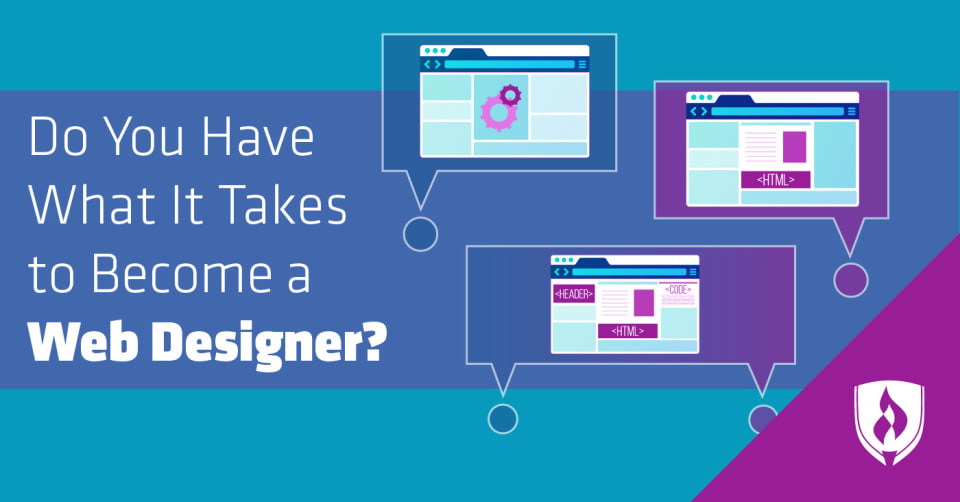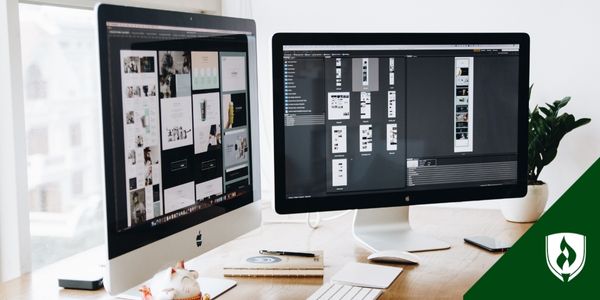
It can be intimidating to start a new career path, especially in a field like web design. It takes a lot of knowledge and technical skill to become a web designer. You want to feel confident you’ll succeed in your new career before investing the time and effort needed to refine your skills.
You’ve always been interested in web design, but you’re still a bit apprehensive. How can you justify putting in so much time when you can’t guarantee whether it’s the right fit for you?
We don’t have a crystal ball to show you your future, but we have the next best thing: insights from seasoned professionals on what it takes to make it in web design. The characteristics described below may reveal you’re more equipped than you thought to become a successful web designer!
Should I become a web designer? Yes, if ...
1. You can explain your ideas in your listener’s terms
It doesn’t take much to just say what you are thinking, but to truly communicate is a different thing. You’ve gotten pretty good at explaining things to people who don’t think like you. Whether it’s translating design terms to family members who want your advice or explaining to your friends exactly what you hated about a movie, you know how to meet people where they’re at.
This communication skill is essential in web design, according to Sherry Holub, creative director at JVM Design. “When just starting out, it’s easy to simply go, ‘Here’s your new design!’ but without explanation, your client may not know how to respond.”
Holub says designers often get vague feedback such as “I don't like it.” or “Can you make it ‘pop’ more?” when they haven’t walked clients through how the design meets their needs. “When you present your design to the client, thoroughly explain why it meets their needs and goals and will connect with their audience,” Holub says. The design exists to serve your client.
2. You believe in collaboration
If this is setting off warning sirens in your head from frustrating flashbacks to the past, try to keep in mind those dreaded group projects in high school often weren’t anyone’s idea of a good time. But you can recall occasions where you worked with friends or created something with a partner that was much better than anything you could have done alone. You appreciate that different people are talented in ways you aren’t and can offer skills and new perspectives—and in a professional setting, everyone is invested in the work.
If you can see the value of good collaboration, you have an excellent perspective for this job.
“An artist with the ability to work with others is rare, but useful,” says Peter Heise of Correct Digital Inc. Heise emphasizes that you can find plenty of business-minded professionals with strong collaboration skills who can fix their mistakes and deliver the product on time, but it’s harder to find a talented artist who can do that.
Part of collaboration is respecting and adjusting to the client’s requests.
“We can’t receive payment until the client is happy with the website,” Heise points out. “The ability to receive and adjust to criticism is important.”
3. You’re handy with technology
Call it extra interest or natural aptitude—there’s something about technology that you just understand. When new platforms catch your interest, you’re a quick learner.
“It’s good to already have an aptitude for web design,” Holub says. “This is something you can of course develop if you have the desire and determination. But since the digital world and the internet are constantly evolving, you’ll need to stay on top of the technology.“
Employers are increasingly on the hunt for web designers who have lots of different skills. “You’ll see the term ‘full-stack’ a lot,” Holub says. “It means they want you to be a good designer and know a number of back-end programming languages, CMS frameworks, software, etc.”
Holub says specializing isn’t impossible, but the industry is moving toward professionals who are more versatile. A natural aptitude in design and technology might be critical to help your continued learning in this career.
4. You can read people
Reading people isn’t that difficult for you. You pick up on body language and facial cues when someone is upset or disinterested, and you adjust your behavior accordingly. This is very valuable in web design.
“Website designs are emotionally laden projects whether for a small business or a large corporation,” says David Erickson, principal of e-Strategy Media. “People tend to invest a lot of their hopes and desires in the outcome.” For this reason, Erickson emphasizes that designers need the ability to read the room and see power dynamics in a group of people.
When you are working on a project, people might feel like their reputations among colleagues are at stake. Different employees might feel invested in making their specific ideas happen—making you the mediator in a project tugged different ways.
“Being able to successfully navigate these relationships and emotions is an invaluable career skill,” Erickson says. “People will often be reluctant to articulate their emotions before a group, so it is important to be able to read their body language and tactfully and diplomatically help them voice their excitement or worries.”
5. You have a thick skin
You’re not too precious about your work. By the time you are showing a design to someone, you are ready to hear their feedback—even if it’s critical. And if you were paid to design something for someone, you wouldn’t take it personally if they wanted you to change things.
“I’ve known many designers just starting out who would really take it to heart when a client said they didn’t like the design they came up with and get upset about it,” Holub says. Overcoming this means understanding that your design isn’t about your ego or portfolio, she explains. “The design you create is for the client’s needs, goals and audience—knowing that will actually help to build self-confidence in the long run.”
6. You’re interested in marketing
In the end, designers tend to love the art of design best. But you know a thing or two about what gets people’s attention and why companies are looking for web designers in the first place.
“While creativity is a great trait to have, being grounded enough to understand that evidence-based marketing will lead to a better return on investment for your client is also key,” Holub says. “When it comes to web design, there is a wealth of research and statistics that can form a solid base for any design decisions you make. A great designer is able to balance evidence with creativity.”
Holub explains that web design has three major aspects to it: function (coding, user interface, etc.); visual (the actual design); and marketing (what actually makes the design work, connect with the intended audience and drive that audience to take action). The function and the visual parts of this career are essential of course, but designers need to understand the marketing function as well.
7. You have lots of patience
Traffic is backed up? No big deal. That soufflé you’ve been trying to master has deflated again? It’s OK—you’ll get it right next time. Your patience levels are legendary, even in the most trying situations.
“Humility and patience are rare in the visual design industry,” says Alex Wright, owner of Alex Wright Web Design and SEO. “Especially coming out of school, designers often view their own aesthetic preferences with a very high regard at the expense of the big picture end goals.”
But Wright says the more humble and patient you can be in your work, the better you can actually influence the final calls on a project.
8. You get things done on time
You took the reins and planned your friend’s surprise party down to the last detail. Your boss never needs to breathe down your neck to make sure your work is getting done. People know they can count on you to get projects done well and on time.
That motivation and time management are critical in the web design field. Heise says time management skills are very important for web designers. “Art is never finished, but business projects have a due date.”
9. You’re naturally curious
Your iPod is loaded with podcasts and audiobooks about every topic under the sun—it’s all so interesting! Your quench for knowledge can’t be satisfied.
Curiosity may have killed the cat, but it definitely didn’t kill the web designer. The design world is constantly being updated with new technology and web designers have to keep up. “Many people think web designers are simply graphic designers for the internet,” Erickson says.
“While graphic design is a large part of the job, really successful web designers are also psychologists, sociologists, technologists, search marketers, social media marketers, usability, analytics and conversion experts.” It takes a wide array of interests to excel in web design, and professionals who are naturally curious will have a much easier time learning what they need.
So, should you become a web designer?
Do the traits above resonate with you? If so, a career in web design may be a great fit for you. You’ve already got the natural chops to make it in the field, all that’s missing is the knowledge and technical skill. As you can see from our experts, there is so much to learn in web design. The best candidates for this career get kind of excited about all there is to know and all the options ahead.
Learn how a Graphic Design degree with a specialization in Web and Interactive Design can help you fill those technical skill gaps and get you started on the path to a new creative career. Additionally, check out our article about everything you need to know about becoming a digital designer.
EDITOR'S NOTE: This article was originally published in 2015. It has since been updated to include information relevant to 2019.




